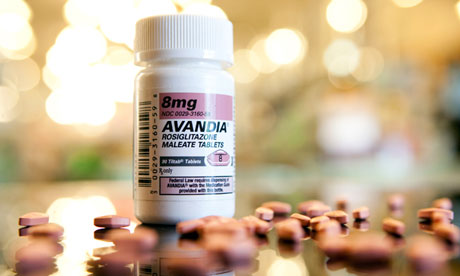Exclusive: Pharmaceutical giant resists claims despite settlement with victims in US

GlaxoSmithKline has agreed to payouts in US lawsuits alleging Avandia pills could cause heart attacks. Photograph: Bloomberg/Getty Images
Thousands of families in the UK could be deprived of compensation for the death or harm of a relative caused by the diabetes drug Avandia, even though the British maker has agreed to pay billions of dollars to settle similar claims in the US.
The licence for Avandia was revoked in Europe, in September 2010, because of evidence that it could cause heart failure and heart attacks. The drug can still be prescribed in the US, but not to patients at risk of heart problems.
A scientist with the Food and Drug Administration estimated that Avandia could have been responsible for 100,000 heart attacks in the US.
The manufacturer, GlaxoSmithKline, has admitted concealing data about the damaging side-effects of the drug, and there is evidence of the drug's harmful effects. But, despite this, GSK is not prepared to settle claims in the UK without a court fight.
The history of drug litigation in the UK suggests that families might not easily get compensation.
Daniel Slade, with the Express company of solicitors in Manchester, has 19 cases on his books and has begun proceedings against GSK in four of them.
The pharmaceutical firm has told the solicitors that it will contest the cases. In just one of the cases it has indicated a willingness to spend £600,000 on its defence, which, the solicitor says, would be a fraction of what the claim is worth.
"It is very disappointing," said Slade. "We anticipate that these claims do have a good prospect of success, but they still have to prove their case in the UK with suitable evidence. They are tasked with having to produce that evidence, including medical expert opinion. It is a burden one would have thought they might not have to go through."
He expected that, if GSK fought in the courts rather than settled outside, as it had done in the US, it would take years for bereaved relatives, or those who have been harmed, to get any sort of payment.
A spokesman for GSK said: "We have every sympathy for people with complications associated with diabetes and those who care for them, but unfortunately we are unable to comment on individual legal cases. We continue to believe that the company acted appropriately and responsibly in its management of Avandia."
Liz Thomas, policy manager at the patient safety charity Action against Medical Accidents, said it had "become increasingly difficult in the UK to challenge large corporations such as pharmaceutical companies, an incredibly expensive form of litigation".
Corporations have a vast amount of money at their disposal to contest legal cases, butlegal aid is about to cease for medical negligence cases.
The Avandia cases in Manchester will be fought on a "no win, no fee" basis by Express solicitors.
The cases in the US were settled by GSK extremely quickly, said Thomas. "I would hope they would not take advantage [in Britain] of the inequality of arms."
Avandia was first introduced in the NHS in July 2000. It was given to people with type 2 diabetes whose glucose levels were no longer being properly controlled by the standard drugs – metformin and a sulphonylurea drug. Avandia could be prescribed with those drugs or on its own.
The drug, which generically is known as rosiglitazone, was designed to lessen the body's resistance to insulin. It was available as a standalone drug – Avandia – or in a combination with metformin, and known as Avandamet.
When both drugs were withdrawn by the European Medicines Agency, there were about 90,000 people taking them in the UK.
The first warnings of trouble with Avandia came in 2007, when a prominent US scientist, Steve Nissen, published data from a review of 42 clinical trials which had been carried out on the drug. The trials involved 28,000 patients, and showed that Avandia could cause heart attacks. Further trials, the results of which were published in 2010, found people on Avandia were 27% more likely to have a stroke, 25% more likely to have heart failure, and 14% more likely to die, than patients on an alternative diabetes drug.
Potentially yet more damaging for GSK was its guilty plea to federal charges of concealing data about the drug's side effects. Most of the data on the drug comes from GSK's own trials. In November 2011 GSK agreed to pay $3bn to the US government over the Avandia issue and to end investigations into its marketing of the antidepressants Paxil (Seroxat in the UK) and Wellbutrin.
"This is a significant step toward resolving difficult, long-standing matters which do not reflect the company that we are today," Andrew Witty, chief executive of GlaxoSmithKline, said at the time.
GSK is also still defending cases in the UK from people who claim to have been badly affected by Seroxat. A group action, involving people who say they suffered severe withdrawal problems when they tried to stop the drug, has been going on for years though many claims have been settled in the US.
The same is true of Vioxx, made by Merck, the painkiller that was withdrawn after it emerged eight years ago that it doubled the risk of a heart attack.